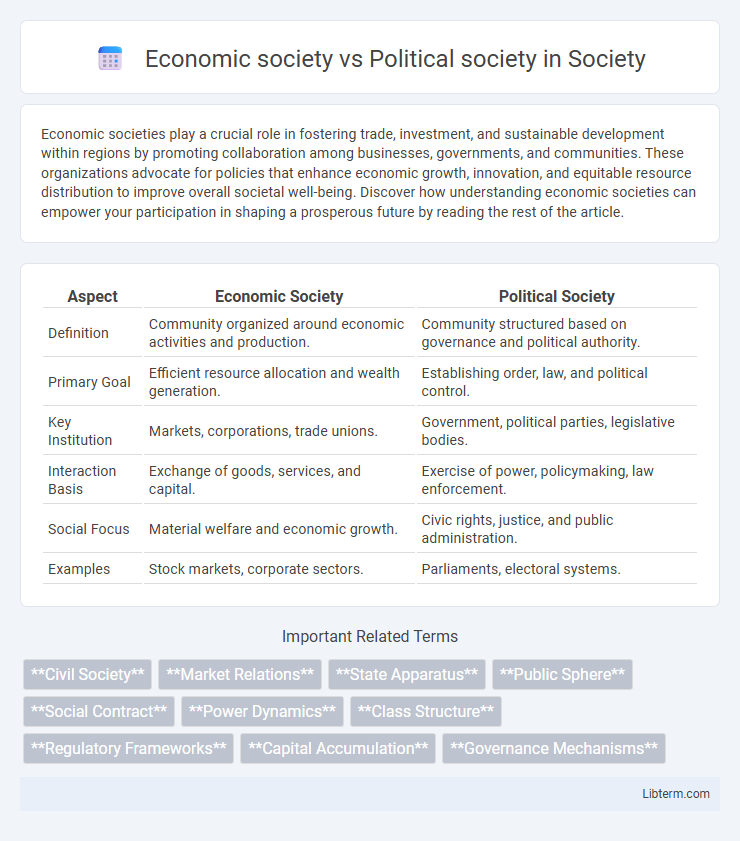Economic societies play a crucial role in fostering trade, investment, and sustainable development within regions by promoting collaboration among businesses, governments, and communities. These organizations advocate for policies that enhance economic growth, innovation, and equitable resource distribution to improve overall societal well-being. Discover how understanding economic societies can empower your participation in shaping a prosperous future by reading the rest of the article.
Table of Comparison
| Aspect | Economic Society | Political Society |
|---|---|---|
| Definition | Community organized around economic activities and production. | Community structured based on governance and political authority. |
| Primary Goal | Efficient resource allocation and wealth generation. | Establishing order, law, and political control. |
| Key Institution | Markets, corporations, trade unions. | Government, political parties, legislative bodies. |
| Interaction Basis | Exchange of goods, services, and capital. | Exercise of power, policymaking, law enforcement. |
| Social Focus | Material welfare and economic growth. | Civic rights, justice, and public administration. |
| Examples | Stock markets, corporate sectors. | Parliaments, electoral systems. |
Defining Economic Society: Core Concepts
Economic society centers on the production, distribution, and consumption of goods and services, driven by market mechanisms and resource allocation. It emphasizes individual choices, supply and demand dynamics, and the pursuit of wealth and efficiency to satisfy human needs. Key concepts include capital, labor, markets, and economic institutions that organize economic activities independently of political authority.
Understanding Political Society: Key Principles
Political society centers on governance structures, authority distribution, and the enforcement of laws to maintain order and legitimacy within a community. Key principles include sovereignty, rule of law, and the social contract, which ensure that power is exercised transparently and with accountability. Understanding political society requires analyzing institutions such as governments, parliaments, and judiciary bodies that balance individual rights with collective responsibilities.
Historical Evolution of Economic and Political Societies
Economic societies initially emerged as cooperative organizations focused on improving agricultural productivity and trade efficiency during the 18th century, reflecting the early stages of industrialization and market expansion. Political societies evolved later, particularly in the 19th and 20th centuries, emphasizing governance structures, citizen participation, and the development of legal frameworks that shaped modern nation-states. The historical evolution of these societies demonstrates a shift from primarily economic collaboration to complex political institutions intertwined with economic interests, driving societal progress and institutional governance.
Interconnection Between Economic and Political Structures
Economic society and political society are deeply interconnected, as economic structures influence political power distribution and policy-making processes while political institutions shape economic regulations and resource allocation. Market dynamics, property rights, and wealth accumulation impact governance models, election outcomes, and legal frameworks within political societies. Conversely, political stability, government interventions, and legal enforcement affect economic development, investment climates, and social equity.
Roles and Functions in Economic vs Political Societies
Economic societies primarily manage the production, distribution, and consumption of goods and services, ensuring resource allocation, wealth creation, and market regulation to promote economic stability and growth. Political societies focus on governance, law-making, enforcement, and maintaining social order through institutions like legislatures, judiciary, and executive bodies that uphold political authority and public policies. The roles in economic societies emphasize market efficiency and capital accumulation, whereas political societies prioritize power distribution, civic rights, and collective decision-making processes.
Power Dynamics: Economic Influence vs Political Authority
Economic society wields power primarily through wealth accumulation and market control, influencing resources and decision-making in business and trade spheres. Political society exerts authority via governance structures, legal frameworks, and institutional power to enforce laws and policies shaping social order. The dynamic tension arises as economic influence can sway political decisions, while political authority regulates economic activities to maintain stability and public interest.
Social Institutions: Economic Agencies and Political Bodies
Economic agencies like corporations, banks, and labor unions primarily manage resource allocation, production, and distribution, shaping social institutions around wealth and employment. Political bodies such as governments, legislatures, and courts formulate laws, enforce policies, and maintain order, structuring social institutions around power and governance. Both entities interact to influence societal stability, but economic agencies emphasize market dynamics while political bodies focus on regulatory frameworks.
Impact on Social Justice and Equity
Economic societies prioritize resource distribution through market mechanisms, often leading to disparities in wealth and access that affect social justice and equity. Political societies establish governance structures aimed at regulating rights and responsibilities, influencing policies that promote or hinder equitable treatment across different social groups. The balance between economic freedom and political regulation critically shapes outcomes in social justice, determining how resources and opportunities are allocated within a society.
Challenges and Conflicts Between Economic and Political Interests
Economic societies prioritize wealth creation, market regulation, and resource allocation, often facing conflicts when political societies impose policies that restrict free enterprise or redistribute resources for social welfare. Political societies focus on governance, lawmaking, and public order, generating challenges when economic interests resist regulations or demand favorable conditions for growth. These conflicting priorities lead to tensions over taxation, government intervention, and the balance between economic freedom and political control.
Future Prospects: Harmonizing Economic and Political Societies
Future prospects for harmonizing economic and political societies center on fostering sustainable development through integrated policy frameworks that align economic goals with democratic governance principles. Emphasizing collaborative governance models enhances social equity and economic resilience, leveraging technological advancements and inclusive decision-making processes. Bridging economic interests with political legitimacy can drive innovative solutions for global challenges such as climate change, inequality, and digital transformation.
Economic society Infographic

 libterm.com
libterm.com